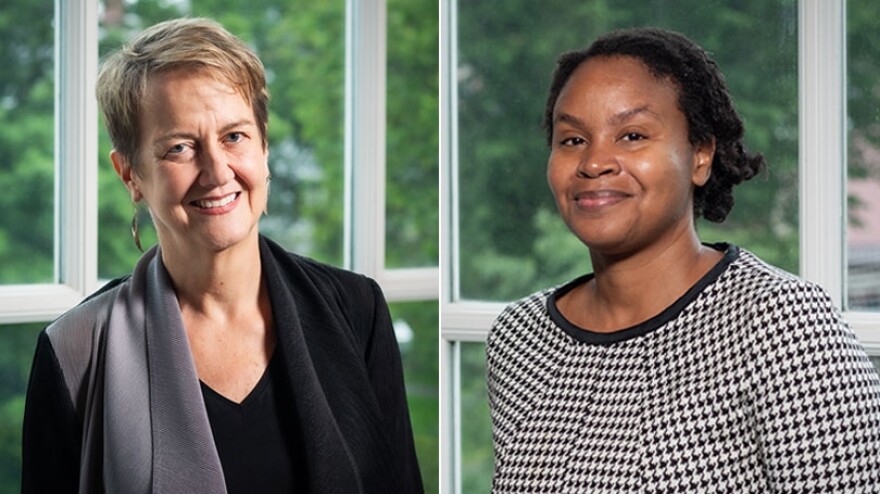Over the last month, Dartmouth College has been hosting a lecture series on the ways in which black women and girls are disproportionately subjected to violence in American society and on how they're often ignored by social justice movements.
The series is called #SayHerName: Intersectionality and Violence Against Black Women and Girls.
And the final lecture is tomorrow. The two professors who coordinated the series, Shatema Threadcraft and Susan Brison talked with All Things Considered Host Peter Biello about how the series has been going.
Note: Transcript has been lightly edited for clarity.
What's societal or academic need did the two of you see for this series? We'll start with you Shatema.
So the Me Too movement was started by a black woman named Tarana Burke, and Black Lives Matter became a movement because of the work of three black queer women. And yet, press coverage of the movement centered the experiences of white women and black men respectively, with regards to Me Too, and Black Lives Matter. Black women's experiences of sexism will be different from white women's. This form of oppression intersects with racism and classism to create distinct harm. So, for example, black women experience higher rates of sexual assault and the assaults are more brutal. They experience higher rates of intimate partner violence and they are more likely to have a gun used on them during that violence. The consequences of that violence are more severe. So they are often arrested alongside their assailant if the police are called. And because there are fewer support services in under-resourced black communities, they have fewer formal resources to turn to after the assault. And I can tell a similar story about how sexism changes black women's experience of racial violence and particularly state violence. And with the recent reception and response to the R. Kelly documentary, we saw an opening to talk about these issues and to re-center black women in the movements that they began. And we were fortunate to have Dartmouth's support in this endeavor.

Both of you are teaching courses this summer related to the series. I was hoping each of you could talk a little bit about those. We'll start with you, Susan.
I'm teaching a course on philosophy and gender. And although I've taught this course many times before, this time I'm really focusing on black feminism and intersectional feminism. And that's highly unusual in philosophy because philosophy is very white and very male dominated. There are extremely few black women philosophers. So in my teaching as well, I really want to give a platform to black women philosophers.
And what about you Shatema?
This term I'm teaching a course on feminist theory. I usually end with the section on intersectionality and violence against women. But because of this lecture series, I put the intersectionality section first and I think it is totally changed the way my students have approached the other texts in the course.
And what kind of responses have you gotten from people attending these lectures?
They've been amazing. The lectures have been packed, standing room only. And we've had our students write responses to each lecture. And I've just been moved by how much they've learned and taken in. I wish I could teach every course like that; incorporating a lecture series, but I don't think Dartmouth is going to let me do that haha.
What I've found in my students response papers is I think they really appreciate the connections that all of our speakers are making between scholarship and activism.
Yes, often they're alienated by some of the courses they take because they're so abstract and so distant from any real world concerns. And so I think it's very encouraging for them, as it is for us, to hear speakers who have managed to combine activism with serious academic work. I think it will encourage our students to see that they don't have to make a choice between being a scholar and an activist. They can be both.
What did each of you learn from the series?
You know, I really learned a lot. And Professor Crenshaw talked about this concept of narrative capital. So what she's speaking on is a fund of stock stories to draw on to mobilize political movements. So I think that black women dealing with sexual violence and intimate partner violence don't have this resource of stories that are broadly shared and understood to be formative of what racial violence means in this country. It's in contrast to the ways in which I've been worried that these kinds of stories can be pornographic. Or sensationalized in the way that women have had to do in retelling their stories of violence and recounting them. And I remember a discussion, where I had a student stop and she asked, "Who are these men, these people who need to hear that rape is wrong? Like, what are these stories doing besides sort of letting people hearing in gory detail the things that have happened to women?" And I think that Crenshaw's point about narrative capital is the best response that I've heard to that. And so it's something that I'm really going to think about a lot going forward.
And what about you, Susan?
I think I became even more aware of how important this concept of intersectionality is and how little understood it is. But really, it's just a framework for understanding how multiple forms of discrimination converge and compound. This has been neglected.









